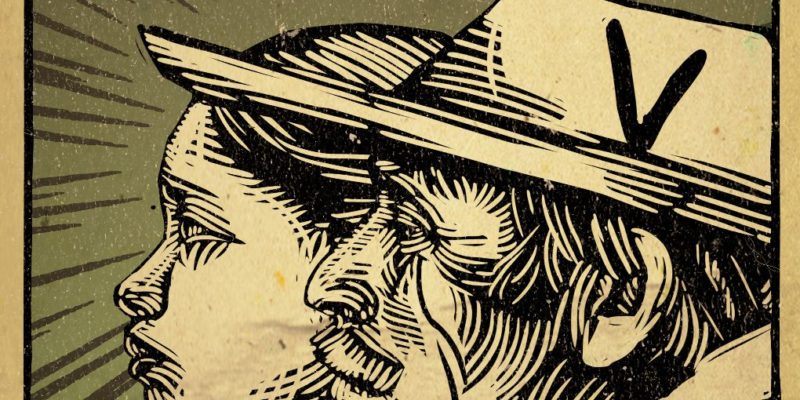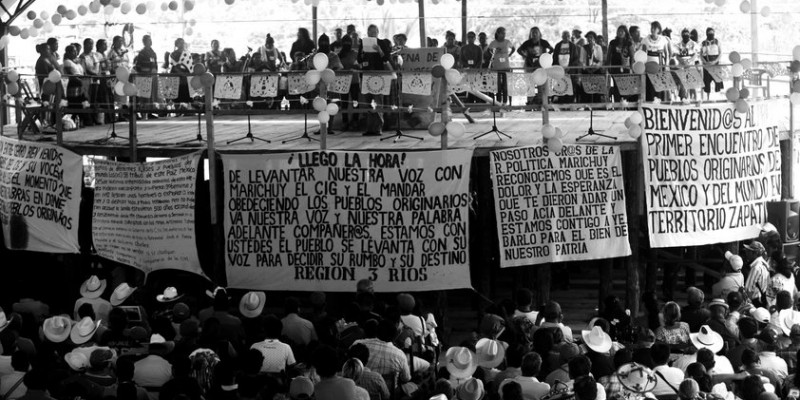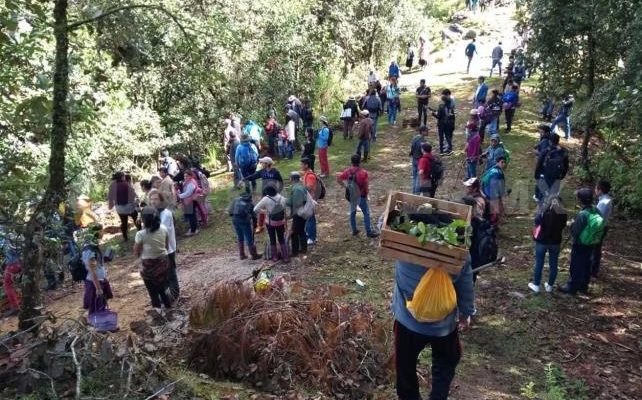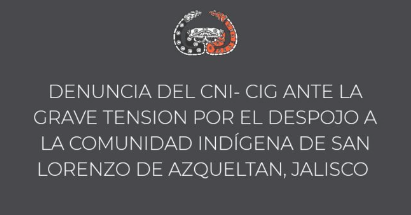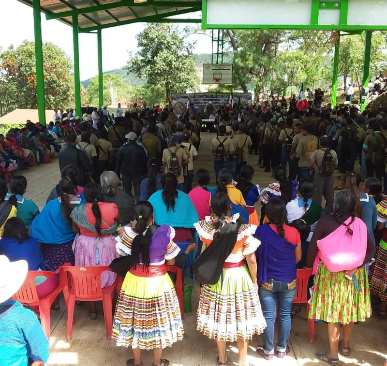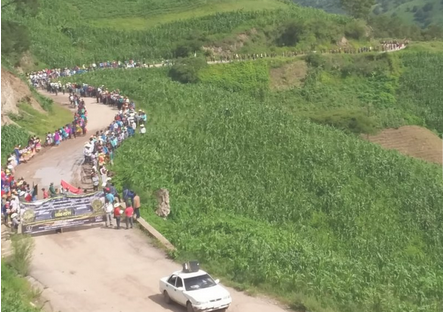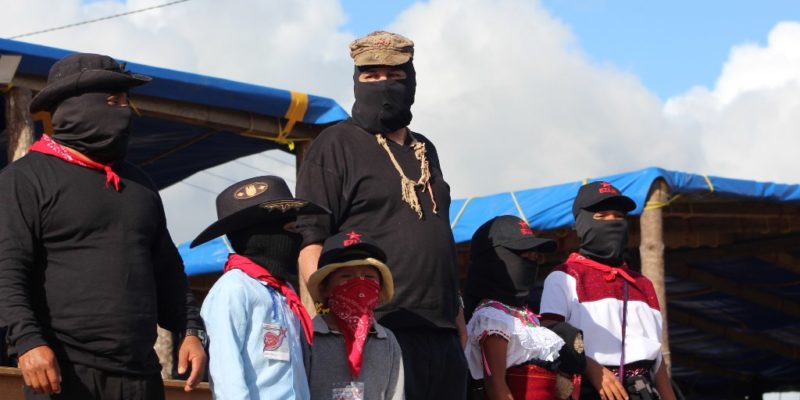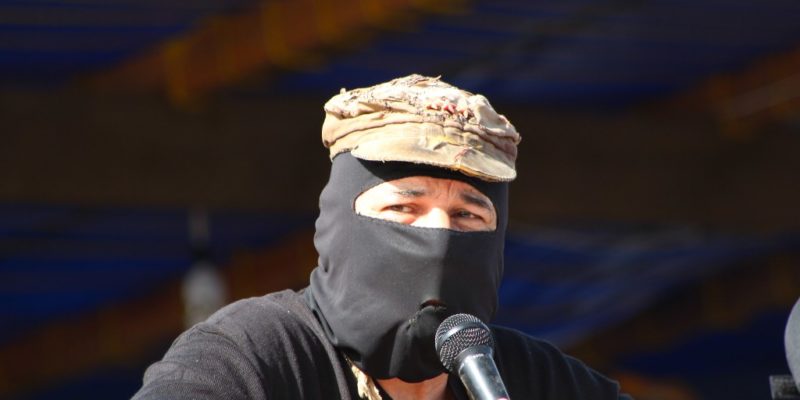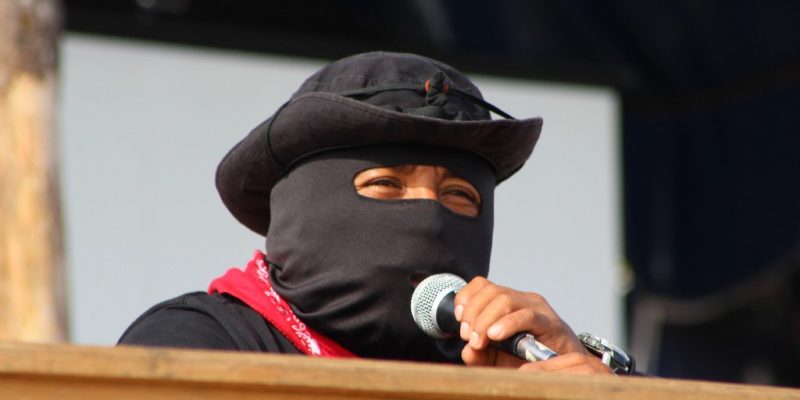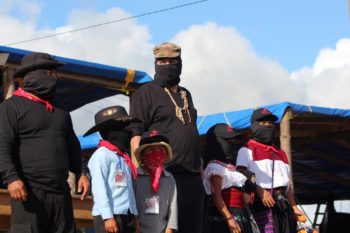300
Part III:
A Challenge, Real Autonomy, An Answer, Multiple Proposals, and a Few Anecdotes about the Number 300
So what’s next?
We’ll have to swim against the current, but that’s nothing new for us Zapatistas.
We want to reiterate—and we have consulted this with the Zapatista communities—that we oppose any and every overseer. We’re not just talking about those who insist they will administrate properly and repress correctly—as in the current proposal to combat corruption and improve security via impunity—but also those whose intentions for hegemony and imposed homogeneity lie just below their vanguardist dreams.
We will not exchange our history, our pain, our rage, and our struggle for a “progressive” conformity which is currently closing ranks behind its leader. We don’t forget, even when everybody else does, that we are Zapatistas.
With regard to our autonomy and the discussion that’s going on about whether it will be recognized or not, we make the following distinction: there is official autonomy, and there is real autonomy. Official autonomy is recognized by law, and this is its logic: “If you have an autonomous system and I legally recognize it, then your autonomy begins to depend on my law and not on your actual autonomous practices. When election season rolls around, you’ll have to support us, voting and promoting the vote for our party, because if another party takes office they’ll undo that law that protects you.” In that logic, we become political party peons, just as has happened to social movements all over the world. The actual function and defense of autonomy ceases to matter; the only thing that matters is what is recognized by the law. The struggle for freedom is in effect transformed into a struggle for the legal recognition of struggle.
-*-
We talked to our “bosses,” that is, the communities that determine our path, our route, and our destiny. We see what is coming through their perspective. We asked them: “if we take this position (what we believe is necessary), what will happen?”
And this is how we answered ourselves: “we’ll be alone and isolated in our position. People will say that we’re irrelevant—that we have placed ourselves outside the great revolution, the supposed fourth transformation, this new religion or whatever you want to call it—and we’ll have to swim against the current yet again.”
But being alone and isolated is nothing new for us. Then we asked ourselves: are we afraid to be alone in what we believe? Are we afraid to hold fast to our convictions and to struggle for them? Are we afraid that the people who previously supported us will turn against us? Are we afraid to refuse to give up, give in, or sell out? We asked ourselves each of these questions and we came to the conclusion that what we were asking was if we were afraid to be Zapatistas.
We aren’t afraid to be Zapatistas and that’s exactly what we are going to continue to be. That was what we asked ourselves, and that was our answer.
We think that, alongside all of you (the support networks), and with everything against us—because we know that throughout this process you didn’t have the support of the media or the masses, nor could you count on pay or popularity (we know you had to use your own money to carry out your work)—we organized ourselves around a collective of originary peoples and a small, brown woman, the color of the earth, to denounce a predatory system and defend our conviction and our struggle.
We’re looking for other people who aren’t afraid. That’s why we want to ask you (the support networks), are you afraid? You decide. If you’re afraid, we’ll look somewhere else.
-*-
We think that we should continue to walk closely with the originary peoples.
Maybe some of you as support networks still think that what you’re doing is supporting the originary peoples. As time goes by you’re going to see that it’s just the opposite: they will support you through their experience and their forms of organization. That is, you will learn, because if anyone is an expert in surviving a storm it’s the originary peoples. They’ve had everything thrown at them and here they still are—here we still are.
But we also think, and compañer@s we want to make this very clear: that won’t be enough. We will have to incorporate into our horizon of struggle all of our own realities and the pain and rage they hold. We will have to move toward a new phase of this process: the construction of a Council that includes the struggles of all of the oppressed, marginalized, disappeared, and murdered, the struggles of political prisoners, of women who have been attacked and harassed, of children who have been prostituted, of all the calendars and geographies that delineate a map that is impossible within the laws of probability and illegible to polls and votes: the contemporary map of rebellion and resistance across the planet.
If we—all of us together—are going to challenge the laws of probability that say there is little to no chance that we will succeed, if we are going to challenge the polls and the millions of votes and the world-in-numbers that Power pulls out to try to demoralize us and make us give up, then we have to make the Council [Indigenous Governing Council, CIG] bigger. At this point this is just a thought that we want to share with you—that we think it is important to build a Council that neither absorbs nor annuls differences, but rather gives each of us the chance to be with others [otros, otras, otroas] who share the same struggle. This is why we think the Council should not be limited by a geography imposed by borders and flags, but should aim to become international.
What we are proposing is that the Indigenous Governing Council cease to be only indigenous and only national in scope.
To that end, as Zapatistas we put forward the following proposals, in addition to the ones already suggested during this gathering, to be consulted with all of your home collectives and organizations:
1. To reaffirm our support for the National Indigenous Congress and the Indigenous Governing Council.
2. To create and maintain open and transparent forms of communication among all of us who have come together on this path of the Indigenous Governing Council and its spokeswoman.
3. To begin or continue our analysis and evaluation of the reality in which we live, and to share with each other these analyses and evaluations as well as our subsequent proposals for coordinated action.
4. Without ceasing our support for the originary peoples, we propose to double down on the work of the CIG Support Networks in order to open our collective heart to all of the rebellions and resistances that emerge and persevere wherever we might be, in the countryside or the city, without regard for borders.
5. To begin or continue the struggle to grow both the demands and dimensions of the Indigenous Governing Council with the goal of extending it beyond originary peoples to include workers of the countryside and city and all of those who have been discarded or marginalized but who have their own history and struggle, that is, their own identity.
6. To begin or continue the analysis and discussion toward the creation of a Coordination or Federation of Networks which avoids any kind of centralized or vertical command and which spares no effort in building solidarity, support, and sisterhood/brotherhood among its participants.
7. Finally, to hold in December of this year an international gathering of networks—we propose that for now we call ourselves the Network of Resistance and Rebellion (and then the name of each collective), but it could be whatever we decide to name ourselves. At that point we will have had the chance to hear, analyze, and evaluate what the National Indigenous Congress and the Indigenous Governing Council decide and propose during their meeting in October, and we will also have the results of the consultation process to be undertaken as a result this meeting we are in right now. We would like to offer one of the Zapatista Caracoles as a location for that upcoming meeting, if you are all in agreement.
Our proposal, then, is not only for the originary peoples, but for everyone [todoas, todas, todos] who resist and rebel in each and every corner of the world, and who challenge every rule, law, mold, dictate, number, and percentage imposed on us.
-*-
First anecdote: During the first days of 1994, the intelligence services of the Mexican army estimated that the self-designated “ee-zee-el-en” consisted of “only” 300 transgressors of the law.
Second anecdote: That same year, as Ernesto Zedillo Ponce de León and Esteban Moctezuma Barragán plotted the betrayal and ambush to be carried out against us in February of 1995,i the Nexos group (dedicated at that time to singing the praises of Salinas de Gortari and Zedillo), exclaimed, out of growing frustration and in so many words by Héctor Aguilar Camín, “Why don’t we just obliterate them? There are only 300 of them!”
Third anecdote: Information from the registration table at the Gathering of Support Networks for the CIG and its spokeswoman, held at the Zapatista Caracol “Whirlwind of our Words” August 3-5, 2018: “attendees: 300”.
Fourth anecdote: Profits of the 300 most powerful corporations on the planet: we have no idea, but it could be 300, or any other number, followed by a shitload of zeros, and ending with “millions of dollars”.
Fifth anecdote: “encouraging” quantities and percentages:
The quantitative difference between 300 and 30,113,483 (the number of votes López Obrador the candidate received according to the INE): thirty million, one hundred and thirteen thousand, one hundred and eighty-three.
300 is 0.00099623% of those more than 30 million votes
300 is 0.00052993% of the total votes cast (56,611,027)
300 is 0.00033583% of the total number of registered voters (89,332,032)
300 is 0.00022626% of the total Mexican population (132,593,000, minus the 7 women who, on average, are murdered daily. Over the past decade, a girl, young woman, adult woman, or elderly woman has been murdered, on average, every 4 hours).
300 is 0.00003012% of the population of the American Continent (996,000,000 in 2017)
The probability of destroying the capitalist system is 0.000003929141%, which is the percentage of the world population (7,635,255,247 at 7:54pm on August 20, 2018), represented by the number 300 (that is, of course, if those supposed 300 people don’t give up, give in, or sell out).
Oh I know, not even the tortoise beating Achilles[ii] would be consolation.
What about a caracol?[iii]…
La Bruja Escarlata?[iv]…
The cat-dog?…
All right, enough of that. What keeps us Zapatistas awake is not the challenge presented by this infinitesimal probability of triumph, but the question of what the world that follows, the one that begins to emerge from the still smoking ashes of this system, will be like.
What will be its ways?
Will its colors speak?
What will its theme song be? (Huh? “The Girl with the Red Bow?”[v] No way).
What will be the lineup of Defensa Zapatista’s (finally) full team? Can Esperanza Zapatista’s teddy bear join the lineup and team up with Pedrito? Will they let Pablito wear his cowboy hat and Amado Zapatista, his crocheted helmet? Why doesn’t the damned referee blow his whistle on the Cat-dog who is so obviously off-sides?
Above all, and most importantly, how will that new world dance?
This is why, when we Zapatistas are asked, “What’s next?” Well…how can I explain it? We don’t answer on the spot, it takes us a bit. The truth is, you’ll see, that dancing a new world is less problematic than imagining it.
Sixth anecdote: Oh, you thought the thing about “300”vi was because of the film by that title and the Battle of Thermopylae, and you were ready to get dressed up like Leonidas or Gorgo (to each their own) and start shouting “This is Sparta!” while decimating the “immortal” troops of the Persian King Xerxes? Man, haven’t I been saying? Those Zapatistas, always watching another movie. Or, worse yet, watching and analyzing reality. What can you do…
-*-
That’s all…for now.
From the mountains of the Mexican Southeast.
Subcomandante Insurgente Moisés. Subcomandante Insurgente Galeano.
Mexico, August of 2018.


